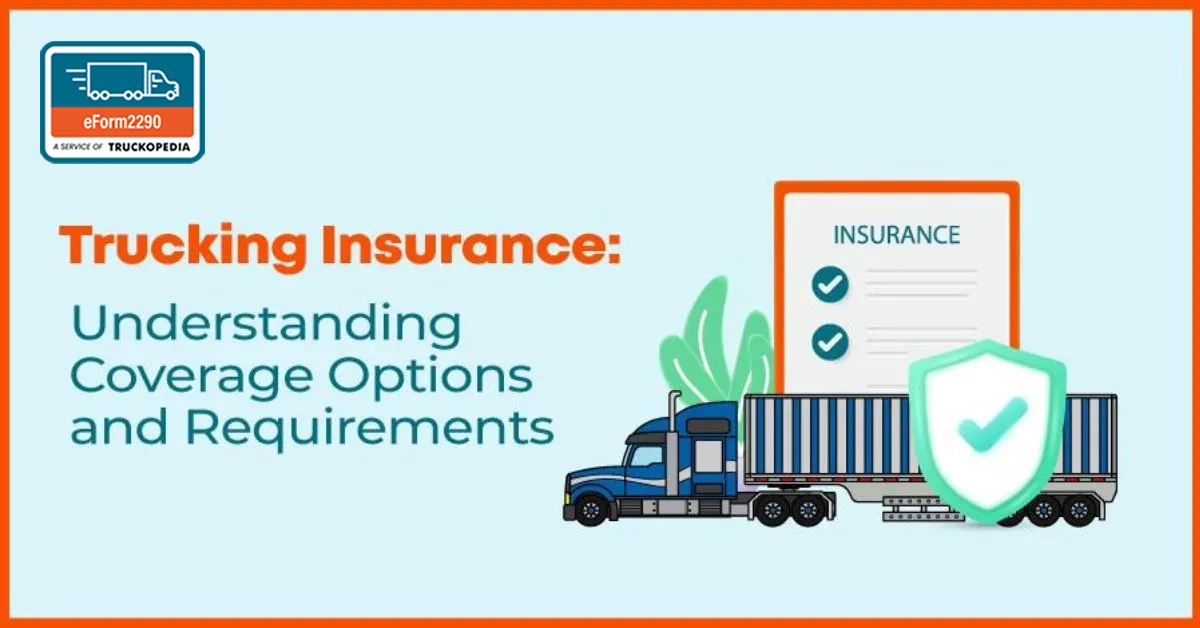Trucking Insurance: Understanding Coverage Options and Requirements

In the trucking industry, where every mile and every load matters, a crucial aspect can sometimes be overlooked: truck insurance coverage. As a trucking professional, it is essential to protect your business with commercial truck insurance coverage that’s tailored to meet your business needs. Having a solid insurance cover is not just a legal obligation, but a great way to protect your business and assets.
With this blog, we will learn more about trucking insurance and various coverage options and requirements.


Understanding Key Coverage Options
1. General Liability Coverage to Protect Your Business
General Liability Coverage acts as the foundation of your truck insurance. It protects you from third-party claims from property damage, bodily injury, or personal injury caused by your trucking operations. For instance, if a delivery causes damage to a customer's property, this coverage steps in to mitigate the financial impact.
2. Primary Liability Coverage to Meet Regulatory Requirements
Primary Liability Coverage is legally mandated for trucking professionals. It covers damages to third parties involved in accidents caused by your truck. This commercial truck insurance coverage is often a prerequisite to obtain operating authority and it is enforced by the Federal Motor Carrier Safety Administration (FMCSA).
3. Physical Damage Coverage to Safeguard Your Assets
Your truck is the lifeline of your business. Physical Damage Coverage makes sure its protection against damage caused by accidents, collisions, or theft. While this coverage isn’t a legal requirement, it’s highly recommended to protect your investment.
4. Non-Trucking Liability Coverage to Cover Coverage Gaps
When you're driving your truck for non-business purposes or for your personal work, Non-Trucking Liability Coverage covers the gap between personal auto insurance and commercial trucking insurance. It offers liability protection when you're off-duty and not under a load.
5. Motor Truck Cargo Coverage to Secure Your Cargo
Protecting the goods you transport is highly important. Motor Truck Cargo Coverage insures your cargo against damage or theft while in transit. This coverage not only safeguards your client's cargo but also maintains your professional reputation.
6. Medical Payment and Uninsured/Underinsured Motorist Coverage
Accidents can lead to injuries, and Medical Payment coverage takes care of medical expenses for you and your co-drivers, regardless of fault. Uninsured/Underinsured Motorist Coverage steps in if the at-fault party doesn't have sufficient insurance, ensuring you're not left bearing the financial burden.
Navigating the Evolving Trends of the Insurance Industry
As the landscape of the trucking industry continues to evolve, it is essential to stay informed about the changing industry trends in the insurance industry. Let’s analyze some of these trends as follows.
1. Rising Costs of Commercial Truck Insurance
It's important to acknowledge that commercial truck insurance costs have been increasing due to various factors, including increased accident frequency, higher medical costs, and the complexity of trucking operations. This makes it crucial for trucking professionals to make informed decisions while selecting coverage options.
2. The Link Between Insurance and Operating Authority
Obtaining operating authority from the FMCSA is a pivotal step in launching a trucking business. However, without adequate truck insurance coverage, your authority could be at risk. Regulatory bodies emphasize the importance of insurance compliance for the safety of all parties involved in trucking operations.
Determining Your Coverage Needs
1. Cost vs. Coverage, Strike a Right Balance
The cost of insurance is a significant factor while considering a plan as it's equally important to prioritize comprehensive truck insurance coverage that aligns with your business needs. Cutting corners on insurance might save money initially but could lead to exorbitant expenses in the event of an accident or legal dispute.
2. Do You Need Trucking Insurance?
The answer is always yes. Operating a commercial truck without proper insurance violates legal requirements as well as exposes you to substantial financial risks. In case of accidents, being unprepared can have seriously tragic consequences for your business and personal assets.
Let’s learn more about a few potential consequences of neglecting an insurance plan.
1. No Authorization Without Insurance
Operating without commercial truck insurance can lead to the suspension of your operating authority. This not only halts your business operations but also tarnishes your professional reputation. Moreover, penalties and legal consequences can be severe, affecting your livelihood.
2. Financial Losses Due to Accidents
Accidents are unpredictable. In the event of an accident, you may face different types of expenses such as legal fees, medical bills, property damage, and even potential lawsuits. These uncertainties can result in severe financial losses. So, having the right truck insurance is really important for your business.
As a trucking professional, every load you transport carries goods and your reputation. Thus, in the business of trucking, insurance isn't just a formality, it's a necessity. Studying various coverage options as per requirements might seem daunting, but it's a critical step toward ensuring the success of your trucking business. Thus, factors such as comprehensive coverage, regulatory mandates, and risks of neglecting insurance, are worth considering while choosing a good insurance coverage for your trucking business.

